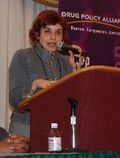Just back from the annual United Nations happy-clappy session about drug prohibition in Vienna, the Commission on Narcotic Drugs. I was there as part of the delegation from Law Enforcement Against Prohibition (LEAP), a global campaign of serving and former police officers, lawyers, judges, intelligence officers, customs officers and prison governors, all with years of experience on the front line of the drug war, and all of whom campaign against prohibition.
Why do they do this? Precisely because they have, during their professional lives, witnessed the terrible failure of the drug prohibition laws.
LEAP’s message is simple, logical and powerful, and its membership credible and experienced — have a look at the website.
The UN delegation consisted of former US drug prosecutor Jim Gierach, retired Brazilian judge Maria Lucia Pereira Karam, award-winning US prison superintendent Rick Van Wickler, and myself.
Needless to say, LEAP and all this breadth of relevant expertise was marginalised at the UN.
 The UN is the sine qua non of bureaucracies, an organisation of such Byzantine complexity it makes your eyes bleed to look at it.
The UN is the sine qua non of bureaucracies, an organisation of such Byzantine complexity it makes your eyes bleed to look at it.
Each country around the world funds the UN via voluntary donations. Once they have coughed up, they are allowed to send national delegates to represent “their” interests at shindigs such as the CND. Those delegates are pre-briefed by their bureaucrats about the line they must take, and no dissent is allowed.
NGOs are notionally able to feed in their views to their delegates, although access is limited, and over the last few years the language of the CND has indeed moved towards harm reduction and children’s rights. But this merely propagates the basic, flawed premise that “drugs” are bad, not that the “war on drugs” has comprehensively failed, is ill-thought out, and actively damages society.
 UN decisions on drug policy are made by consensus, which means that there is no real democratic debate and that the resolutions are so bland as to be meaningless. At no point whatsoever are evidence-based alternative solutions, such as regulated legalisation, even whispered in the corridors of power.
UN decisions on drug policy are made by consensus, which means that there is no real democratic debate and that the resolutions are so bland as to be meaningless. At no point whatsoever are evidence-based alternative solutions, such as regulated legalisation, even whispered in the corridors of power.
The CND’s key achievement this year was to get all the nations to reaffirm their commitment to the 100-year old International Hague Convention, the first drug prohibition law in a long and escalating legal litany of failure and harm. And this in the teeth of all evidence provided by the successful decriminalisation experiments in Portugal, Switzerland and the Netherlands.
So here’s where the fun kicks in, but I stress that this is my highly personal take on what it was like to attend the CND last week:
.….….
WARNING: CND appears to be a potent psychotropic drug which has unknown and potentially damaging effects on the human brain. Exposure to CND for even so short a period as a week can lead to disorientation, numbness, depression and a dislocation from reality. No data exists about the long-term psychological effects of prolonged exposure, but some subjects can display uncharacteristic aggression after only a couple of days’ experience of CND.
CND appears to be highly addictive leading to rapid dependency, and delegates return year after year for another hit. For a week, it’s party time, but then comes the crashing low, as they have to push CND on their own countries for another long year, against all common notions of decency, humanity and community.
CND is continually presented to vulnerable delegates as the only lifestyle choice. Those who question its efficacy are outcast from the gang. But what of the delegates’ rights to live a CND-free life, away from the peer pressure, bullying and violence? What about reducing the harm that CND increasingly causes to communities across the world?
As the godfathers of CND push the line of harm reduction programmes, developing countries are increasingly drawn into a life of sordid “money dependency”, even prostituting themselves politically to enable their continued reliance on CND.
The organisations controlling CND garner huge profits, and there is little political will to change the current set-up.
.….….
So, a win-win for the drug cartels, terrorists, enforcement agencies, governments, bureaucrats and the wider global “drug war” infrastructure.
Not so good for the rest of us.


 The
The 


 Richard Van Wickler, a currently-serving jail superintendent who will be representing Law Enforcement Against Prohibition (
Richard Van Wickler, a currently-serving jail superintendent who will be representing Law Enforcement Against Prohibition ( Former Chicago drug prosecutor James Gierach, recently a featured speaker at a conference in Mexico City last month attended by the first lady of Mexico and the former presidents of Colombia and Brazil, says, “The unending cycle of cartel violence caused by the prohibition market has turned a steady trickle of former elected officials criticizing prohibition into a flood of sitting presidents, business leaders and law enforcement officials calling for an outright discussion about legalization. It’s time for the U.S. and the U.N. to acknowledge that legal control, rather than criminalization, is a much better way to manage our drug problems. The world can have either drug prohibition, violence and corruption or it can have controlled drug legalization with safe streets and moral fabric, but it can’t have both.”
Former Chicago drug prosecutor James Gierach, recently a featured speaker at a conference in Mexico City last month attended by the first lady of Mexico and the former presidents of Colombia and Brazil, says, “The unending cycle of cartel violence caused by the prohibition market has turned a steady trickle of former elected officials criticizing prohibition into a flood of sitting presidents, business leaders and law enforcement officials calling for an outright discussion about legalization. It’s time for the U.S. and the U.N. to acknowledge that legal control, rather than criminalization, is a much better way to manage our drug problems. The world can have either drug prohibition, violence and corruption or it can have controlled drug legalization with safe streets and moral fabric, but it can’t have both.” Also attending the conference on behalf of
Also attending the conference on behalf of 